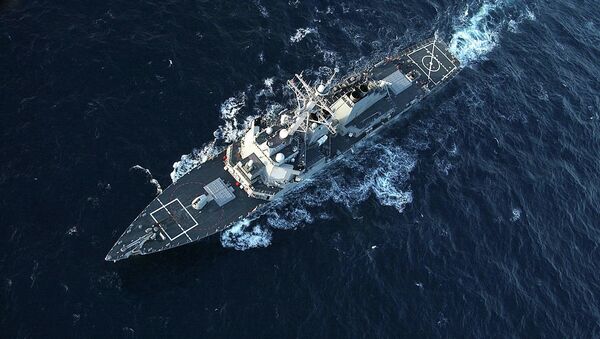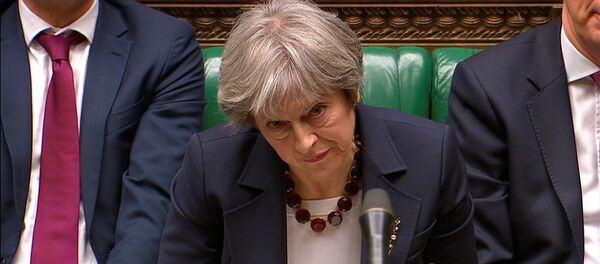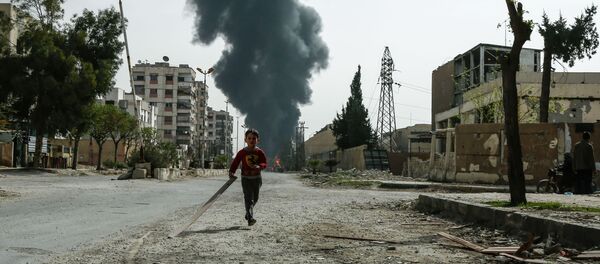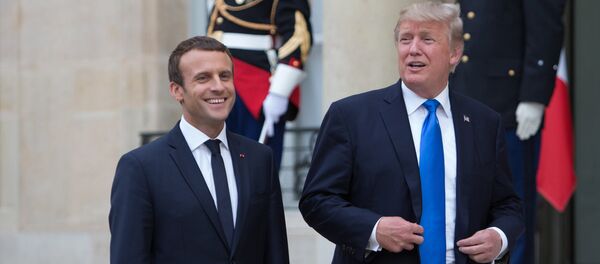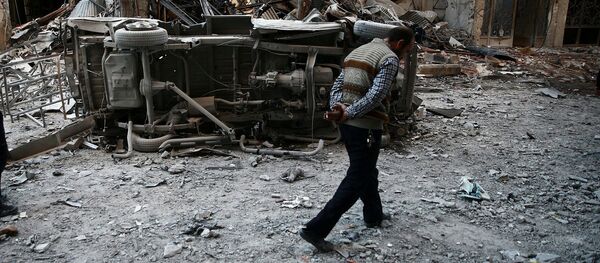At the same time, Russia has urged the international community to show restraint, pointing to the fact that the Organization for the Prohibition of Chemical Weapons (OPCW) found that the Syrian government's stockpiles of chemical weapons were destroyed in 2014.
Russia's Permanent Representative to the UN Security Council Vassily Nebenzia has called upon his Western counterparts to "come to [their] senses" and wait for the results of the OPCW's fact-finding mission.
With Russia and US finding themselves in a highly confrontational situation, other key actors remain divided on whether to support the new US intervention in the Middle East.
UK: Paralyzed by "Special Relations"?
Consequently, the reaction of British Prime Minister Theresa May, who quickly repeated Trump's rhetoric and blamed Assad, was not surprising.
"All the indications are that the Syrian regime was responsible," she said immediately after the attack took place.
READ MORE: Theresa May Blames Syrian Government for Alleged Chemical Attack
According to the "well-paced sources" cited by the BBC, May will make a case for "urgent" strikes against Syrian forces before her cabinet ministers this Thursday.
For this purpose, Royal Navy submarines have been deployed in striking range of Syrian Army positions, according to The Telegraph.
Bypassing the Parliament, however, is a risky move for the embattled Conservative prime minister, whose party has lost its clear majority in the legislature in the 2017 elections.
READ MORE: Not in My Name, Theresa May: Social Media Users Oppose UK Strikes in Syria
As a result, during her telephone call with Trump, May reportedly stated that she required more evidence of Assad's culpability for the strike, therefore leaving herself a certain amount of wiggle room.
France: Globalist President up for Colonial Adventure
A somewhat less expected participant in the looming strike is France, owing to the country's previous resistance to being dragged into the Iraq War, where no weapons of mass destruction were found, despite claims by the US government.
The new French president, Emmanuel Macron, has decided to follow in the footsteps of his predecessors by agreeing with Trump to conduct a joint operation against the Syrian government.
"Regimes that think they can do everything they want, including the worst things that violate international law, cannot be allowed to act," he said in a TV interview.
It seems that Macron even managed to overcome May in his eagerness to join the Americans, as he claimed that France actually has evidence against the Syrian government to "take a decision in due course."
"We have proof that last week chemical weapons, at least chlorine, were used by the regime of Bashar al-Assad," he said without giving details.
Macron's readiness to use military force against Syria may be explained by the desire to boost his dwindling approval ratings, which have fallen by some 12 points over the past couple of weeks.
READ MORE: Macron Claims to Have Proof of Chemical Weapons Use by Syrian Government
According to Le Figaro, the French military has already submitted plans for the Syrian operation to Macron, confirming the willingness of the French president to intervene in yet another former protectorate.
Germany and China: Voices of Reason
Despite the increasingly militaristic stance of the French government, the EU remains fragmented over the various aspects of the Syrian crisis.
This time, the major dissenting voice was Germany, whose chancellor, Angela Merkel, refused to participate in the US strike.
READ MORE: Germany Will Not Join Bombing Campaign in Syria — Chancellor Merkel
Although Merkel expressed limited formal support to the Western actions against Assad, stating, "It is important to show unity on Syria," she deprived the US and Britain of comprehensive EU support for the operation.
"Germany will not take part in possible military action — I want to make clear again that there are no decisions — but we see, and support this, that everything is being done to send a signal that this use of chemical weapons is not acceptable," she said Thursday.
Another major opponent of the West's rushed decision to intervene in Syria is China, which has reasonably taken a cautious approach to the alleged Douma incident.
Speaking to the media, Foreign Ministry Spokesman Geng Shuang reiterated that China "opposes any use of chemical weapons by any country or individual under any pretext," branding such actions as "unacceptable."
At the same time, Geng Shuang expressed China's support of the OPCW's fact-finding mission, which is yet to reach the site of the alleged attack.
"Concerning the recent incident in Syria, we are calling for a comprehensive, impartial and fair investigation," he said.
The spokesman also called upon all participants of the conflict to show restraint until the investigation is complete.
"We also hope that all the parties will demonstrate a constructive approach and promote a solution of the issue via consultations, as well as stimulate efforts toward a political solution to the Syrian crisis," he added.
Iran: Regional Powerhouse Vows Resistance
The strongest reaction to US military intervention in the Middle East came from Iran, which has aided the Syrian government from the start of the conflict.
Speaking to IRNA on Sunday, a spokesman for the Iranian Foreign Ministry, Bahram Qasemi, said that the reports of the alleged gas attack "do not match facts" and are nothing more than "an excuse" for the US and its allies to forcefully intervene in Syria.
READ MORE: Iran Vows to Stand With Damascus Against US and Israeli 'Foreign Aggression'
"Such claims and allegations by the Americans and some Western countries point to a new plot against the Syrian government and people, and are an excuse to take military action against them," he said.
Speaking to IRIB, a state-owned broadcaster, Ali Velayati, the senior foreign policy adviser to Iran's supreme leader, was even more vocal in criticising the Western actions and vowed that Iran would "stand by Syria's government" if the US and its allies attack.
"We will stand by Syria's government against any foreign aggression… Iran backs Syria in its fight against America and the Zionist regime [Israel]," he said.
Tehran remains a major player in the region, offering extensive support to the Syrian government and acting as a counterbalance to the increasingly expansionist Western actions in the region.

